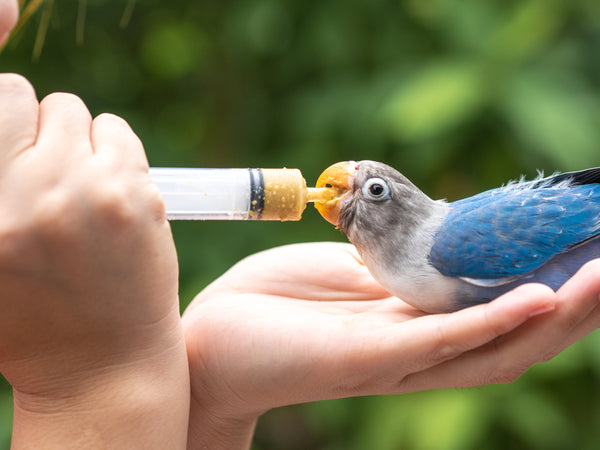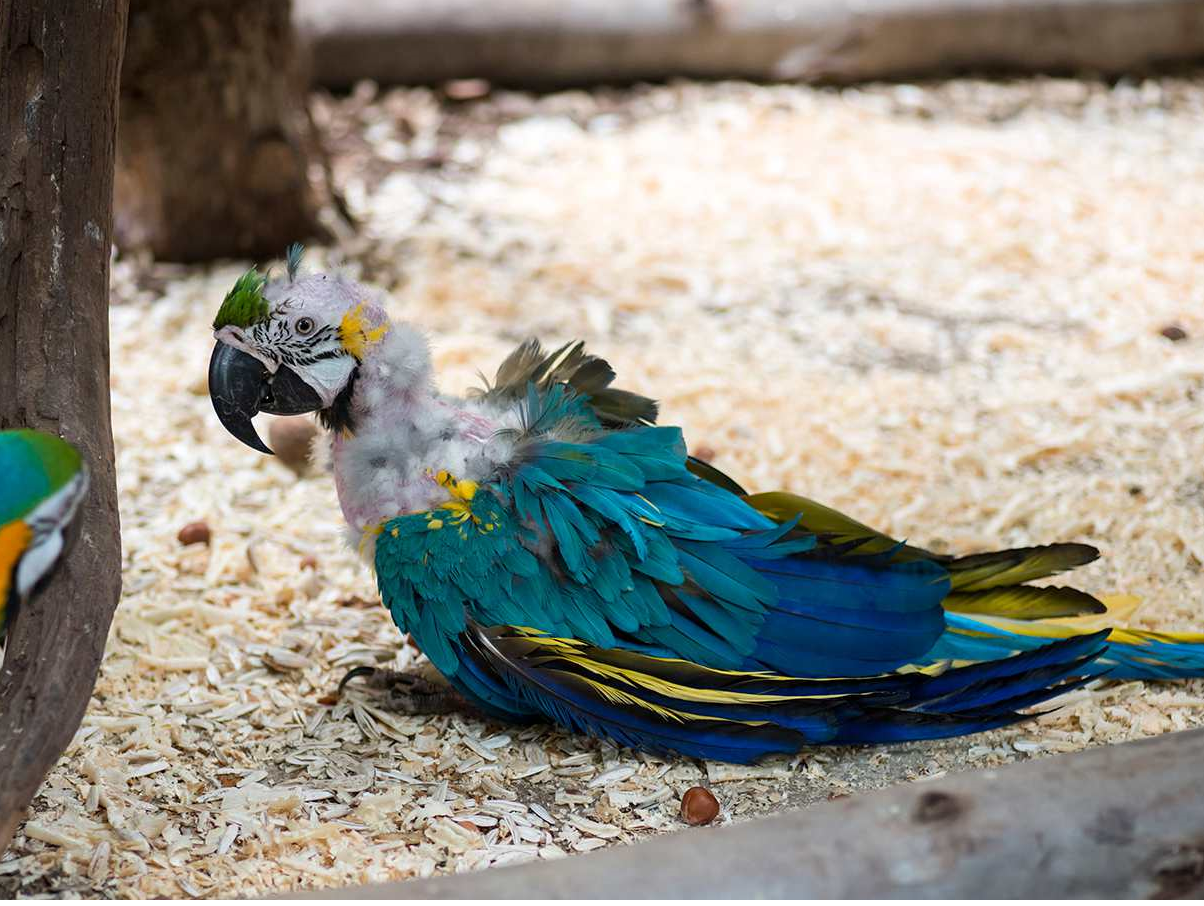Table of Contents
What does parrot stress look like?
Parrot stress is a very common problem that stems from a variety of causes.
But, first things first. What are the signs of parrot stress or anxiety?
According to Laurie Hess, DVM, Diplomate ABVP, there are 7 common anxiety related behavioral symptoms that we see in our parrots. In human psychology, we refer stressed out behavioral responses as externalizing - or acting out - and internalizing - or taking stress out on oneself.
We actually see similar responses in bird stress. These include externalizing behaviors in which a parrot “acts out” its stress with behaviors like biting, lunging or screaming.
Stressed parrots may also engage in internalizing behaviors, or behaviors that are turned inward in a self-harming manner, such as decreased vocalizations, feather picking, self-mutilation, stereo-typical behaviors and decreased appetite.
What causes parrot stress?
So, what causes parrot anxiety anyway? Researchers believe that there are a few common themes of why parrots are more prone to anxiety than other pets, like a dog or a cat. First, parrots are exotic pets and their bodies have simply not adapted to domestic life. While loved like children by devoted parronts, parrots have a very different ecological and evolutionary story than human children.
According to AEON,”A human-weaned parrot... is tame, but its behavioral repertoire is still wild, a true descendant of the dinosaurs.” Second, parrots rely on large flocks for safety and almost all activities of daily living. It is impossible for most parronts to offer their pet this level of companionship. Next, parrots are highly intelligent and need considerable amounts of intellectual stimulation to keep their mind healthy. And, finally, the unnatural act of pulling a baby chick from parental care to hand-rear it for becoming a human companion literally changes brain development, in the critical stress response areas of the brain.

Let’s examine these causes more closely. From a species standpoint, parrots are exotic pets with specialized physical, social and intellectual needs that human caretakers may not know much about. Parrots have distinct dietary needs, sleep needs, and exercise needs. When their physiological needs are not met, it is physically uncomfortable and stressful for the bird.
Parrots also have complicated social needs that, in the wild, are met in large flocks. Baby parrots may live with parents for up to two years to learn everything that they need to know to thrive in and contribute to the flock. All along this parronting period, the young parrot is developing a sense of self-confidence as it is learning both survival and social skills that make it a contributing member of their society while preparing it for parenthood to raise its young.
Also, parrots are highly intelligent and they can become bored without adequate mental stimulation. The daily life of a wild parrot is chock full of working with its flock-mates to keep the flock safe, well-fed, and care for the young and elders. And, of course, to raise young of their own, with a chosen mate. All along the way, from hatching through adolescence, the parrot brain is developing toward becoming a senior member of their society.
Pet parrots have a very different upbringing and existence than wild parrots. We are now realizing that the simple fact of being separated from parental care and important early flock imprinting may actually make the stress responses in the brain more hyperactive. This abnormal brain development is believed to set the stage for a nervous prone parrot.
So, if parrots, already hyper-vigilant animals of prey, then develop overactive stress centers in their brain from being hand-reared, it can become highly reactive to stress. For this reason, creating as stress-free of an environment for your pet will be essential.
Are pet birds more prone to stress than wild ones?

Sadly, the simple answer is yes. Let’s dive deeper into altered brain development for a bit. I’m no neurologist, but as a trauma informed clinical mental health professional, I’ve developed a decent understanding on its effects on the brain. And, of course, research in brain functioning is exploding these days.
For decades, baby chicks have been removed from parent care in favor of hand-rearing them so that they imprint on humans. Hand-rearing was thought to make better pets. Prior to 2006 there were few studies about the social and sexual behavioral effects of hand-rearing in parrots. Schmid, et. al (2006) undertook a study about the influence of breeding methods on African Grey Parrots. They studied 103 grey parrots comparing hand-raised to parent raised and other variables including the method of hand-rearing and related these methods with various behavior disorders in parrots.
The findings suggest that hand-reared parrots experience much higher levels of life-long stress than parent-reared chicks. Parent-reared chicks are introduced to critical social and emotional developmental milestones that hand-reared chicks simply miss out on.
“The hand-reared chicks brain development, due to not imprinting with its own species is adversely affected, especially in the stress response regions of the brain.”
Many breeders pull chicks as young 2 and 6 weeks of age to imprint them to humans, believing that this makes for a better pet. In this early phase of life, parent raised chicks are learning trust, mood regulation, self-care, safety skills and social skills from mom and dad. As they mature, the chick eventually joins the flock where it has thousands of role models coach it on everything it needs to know to care for itself, including feather care. Of course, the longer the chick stays with mom and dad and same species flock-mates, the better adjustment the bird has.
The researchers found that hand-reared birds are more prone to a variety of behavioral disorders including stereotypic movements, nervous repetitive habits, and phobic behavior. Some birds turn their behavior outwards lashing out at others. This would be the bird that bites, screams for hours a day, or lunges and attacks. Other birds turn their frustrations inward with pacing back and forth, unusual repetitive behaviors, unreasonable fears and phobias and feather plucking.
The study confirmed that indeed, hand-reared birds demonstrate more aggression towards humans than parent raised birds, especially tube fed birds, who've come to associate hand-feeding with discomfort and aggression. This human imprinting stress may result in increased aggression toward humans. As the bird progresses toward wanting to mate, it feels an intense need to protect its love-relationship. Combine that with significant tension of being unable to actually breed and reproduce with it’s human lover and you can imagine the angst. The bird is guarding its love interest “territorial aggression,” but it will never be able to mate. Territorial aggression is less out of fear and more about defending their perceived human mate from "intruders."
Hand-reared parrots are also prone engaging in more infantile behavior, such as begging for food and petting. These birds may have missed out on a natural weaning process that ends with feelings of independence. They’ve also missed the opportunity to learn important same species social interactions would enable them to feel self-sufficient.
One of the things birds learn from elder flock mates is how to properly preen their feathers. Hand-reared parrots miss out on important feather care procedures, so they tend to either under preen or over preen, and some don’t even know that they have a preening gland or need to bathe! Poor feather grooming and skin maintenance results in scraggly or barbered feathers, brittle feathers and feather shafts and dry, itchy skin situation. Each of these effects can cause considerable discomfort for the bird which can easily progress into a feather plucking problem.
Chicks that were sold prior to successfully weaning and then transferred to owners who had no experience hand-rearing chics, seemed to have a higher incidence of significant difficulties than successfully weaned chicks. Parrots that weaned independently and then were offered time in an aviary with same species actually learned more species-specific behavioral patterns and fared much better.
Related Posts:
4 Tips To Train A Nervous Bird
5 Essential Ways To Reduce Bird Stress
Resources:
- Why birds are smarter than you think February 15, 2018, Written By Matt Woo https://www.uchicagomedicine.org/forefront/biological-sciences-articles/2018/february/why-birds-are-smarter-than-you-think
- https://www.petmd.com/bird/behavior/how-tell-if-your-bird-unhappy-or-stressed-and-what-do Laurie Hess
- Friedman, S.G., Straight Talk about Parrot Behavior. Originally presented at the StopPDD Conference, Nov. 2004.
- Aeon, Not Just a Pretty Boy, 5 February 2013, Ilan Greenberg, https://aeon.co/essays/why-does-keeping-a-bird-in-a-cage-make-people-happy
- Prevention Special Report CBD 101. Hearst Specials, Hearst Magazine Media, Inc. New York, NY. 2019. P. 94
- https://www.marijuanabreak.com/cbd-third-party-lab-reports. Don Ballou 2019-07-16
- Schmidt study
Diane Burroughs, LCSW is a licensed psychotherapist trained in ABA therapy techniques. She specializes in avian anxiety disorders and is certified in Nutrition For Mental Health. Diane has written a number of bird behavior books and she offers behavior consultations. She's developed a range of UnRuffledRx Science-backed Parrot Wellness Supplies.
Diane's products have been featured in the Journal of Avian Medicine and Surgery and at Exoticscon, a conference for exotic pet veterinarians. Her bird collars & supplements are stocked in avian vet clinics and bird stores throughout the US. With over 30 years in the field of behavior, Diane has created thousands of successful individualized behavior plans that help pets thrive.
TAGS: #BirdStress #BirdStressBars #HowToHelpAStressedBird #ParrotStress
SHARING IS CARING! PLEASE SHARE ON YOUR FAVORITE SOCIAL MEDIA NOW!














